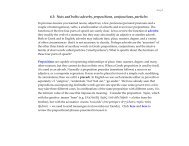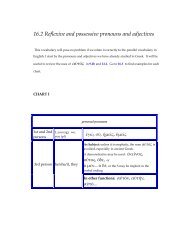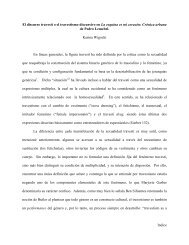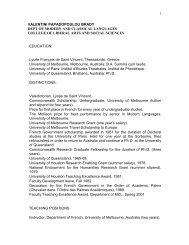Revenge, Justice, and the Law
Revenge, Justice, and the Law
Revenge, Justice, and the Law
You also want an ePaper? Increase the reach of your titles
YUMPU automatically turns print PDFs into web optimized ePapers that Google loves.
42 THE WAYNE LAW REVIEW [Vol. 50:4<br />
enormous undertaking. However, <strong>the</strong> law is <strong>the</strong> only venue which can<br />
provide victims with one source of <strong>the</strong>ir recovery; that is, <strong>the</strong> knowledge<br />
that <strong>the</strong>ir offender has been adequately punished. If <strong>the</strong> law fails to perform<br />
that function, <strong>the</strong>n society faces <strong>the</strong> very perils which forced <strong>the</strong> state to<br />
first interject itself into resolving disputes between its citizens; that<br />
individuals will seek revenge on <strong>the</strong>ir own, thus leading us back to <strong>the</strong> days<br />
of <strong>the</strong> blood feud.<br />
What I believe is Professor B<strong>and</strong>es’ underlying premise is that <strong>the</strong> law<br />
cannot simply base <strong>the</strong> harshness of punishment upon <strong>the</strong> level which<br />
victims believe <strong>the</strong>y need for closure. 181 For example, assuming that a<br />
victim of an assault could demonstrate that her emotional healing depended<br />
upon <strong>the</strong> execution of her assailant, such a level of punishment could not be<br />
justified since <strong>the</strong> penalty would clearly be disproportionate to <strong>the</strong> crime.<br />
However, as argued earlier, <strong>the</strong> calculations of proportionality are not<br />
capable of exactitude. 182 There are ranges of punishments which could be<br />
deemed to be proportional <strong>and</strong> just. All that I am suggesting is that given <strong>the</strong><br />
emotional healing which vengeance may provide to victims, 183 it is a<br />
181. Id. at 1606 (“Sometimes <strong>the</strong> legal system may be able to provide a punishment,<br />
or a result, that meets <strong>the</strong> individual’s needs for vengeance, forgiveness, closure . . . . But <strong>the</strong><br />
legal system cannot <strong>and</strong> ought not meet such needs on a case by case basis.”).<br />
182. See supra note 69.<br />
183. Professor B<strong>and</strong>es, in her article, Reply to Paul Cassell, What We Know About<br />
Victim Impact Statements, 1999 UTAH L. REV. 545, 551 (1999) [hereinafter Reply to Paul<br />
Cassell], notes that <strong>the</strong> empirical evidence is inconclusive regarding whe<strong>the</strong>r victim impact<br />
statements increase victim satisfaction with <strong>the</strong> criminal justice system. This argument has<br />
been raised by o<strong>the</strong>r commentators when arguing against victim involvement. See, e.g.,<br />
Henderson, supra note 16, at 964-66.<br />
I would respond to <strong>the</strong>se comments with <strong>the</strong> following points. First, I must confess a<br />
certain skepticism regarding such studies, or at least <strong>the</strong> way <strong>the</strong>y are used by some to argue<br />
against victim involvement based upon revenge. For instance, it would appear that those<br />
studies cited by Professors B<strong>and</strong>es <strong>and</strong> Henderson deal primarily with <strong>the</strong> efficacy of victim<br />
impact statements to assist in <strong>the</strong> healing process. See, e.g., Edna Erez, Who’s Afraid of <strong>the</strong><br />
Big Bad Victim? Victim Impact Statements as Victim Empowerment <strong>and</strong> Enhancement of<br />
<strong>Justice</strong>, 1999 CRIM. L. REV. 545, cited in Reply to Paul Cassell, supra note 183, at 552 n.31.<br />
It might well be that <strong>the</strong> reason victim impact statements do not significantly help victims<br />
is because <strong>the</strong>y do not give victims enough of a voice in <strong>the</strong> decision making process. In that<br />
event, I would suggest that <strong>the</strong> remedy would be to provide greater victim participation,<br />
ra<strong>the</strong>r than less. See infra note 244 <strong>and</strong> accompanying text (discussing possible alternatives<br />
to victim impact statements).<br />
Next, while <strong>the</strong> studies may be inconclusive, <strong>the</strong>y do not prove <strong>the</strong> ineffectiveness of











